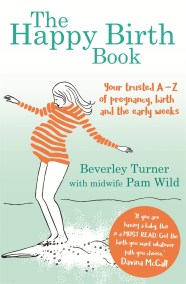The new parent’s guide to sleep

Sleep is every new parent’s favourite topic of conversation – hardly surprising when being sleep-deprived affects everything we do. So how do you cope in those early weeks when you’ve brought your little bundle of joy home? Here, Beverley Turner, mother of three and founder of The Happy Birth Club, shares her advice.
Routine
Don’t expect your baby to find any sort of routine for the first four to six weeks, no matter what others might suggest. It’s totally unrealistic to expect your baby to sleep from 7pm until 7am at this stage (and if you want to breastfeed, it isn’t even advisable). You can easily feel like you are ‘failing’ if you believe this is possible.
For the happiness of most parents, however, it is worth teaching babies the difference between night and day: keep night feeds quiet and dark; daytime should be more lively. Don’t feel you have to put your baby in a darkened room for daytime naps – a flexible baby will fit in around your needs (to some extent) and a rigid routine means that you won’t be able to go out during their bed-ridden nap times. This may drive you nuts, especially when you see that your antenatal classmates are all meeting for lunch at midday but you need to be at home with your baby in a blacked-out room. In that situation, nobody wins.
Remember that babies cry because they are: hungry, wet, cold, tired, bored or in need of a cuddle. That’s it. If there is anything more serious going on healthwise, there are normally other symptoms: a temperature, listlessness or a rash, for example.
If your baby is crying incessantly, take a deep breath and stay calm. If they are dry, fed and cosy, they may simply be crying themselves to sleep. I believe the greatest gift you can give a baby is the ability to self-soothe and put themselves to sleep. This doesn’t mean leaving them in a room alone until they stop crying because they have given up on the idea that you will come back. That isn’t cool for mum or baby.
Tired babies rub their eyes, blink slowly and yawn. But it is extremely easy to mistake a crying, sleepy baby for a hungry one. Their innate instincts mean that they may wish to suck themselves to sleep, but as soon as you put them on the breast or offer a bottle they nod off after a few sucks. If you notice your baby doing this, you may want to try using a dummy to give them some relief. But keep it for nap and bedtimes, and as soon as they fall asleep, gently take it out.
Dummies are a source of controversy, and rightly so. Few sights make me more bemused than seeing a two-year-old walking around a supermarket with a dummy in its mouth – they aren’t developing their speech and have become ‘addicted’ to the dummy as a crutch. This makes it very difficult for the parent to wean them off. But a well-timed dummy for a sucky baby that you remove once they drop off to sleep is one tool to have in your armoury.
If your baby is refusing to sleep and you feel yourself getting wound up and angry, step back and think: is she hungry? No. Is she wet? No. Is she cold? No. Is she tired? Yes.
So hug them, kiss them and put them down safely in their cot while you go and make a cup of tea. This will be the longest three minutes of your life. But the chances are, they’ll be asleep when you come back. If not, give them a quick cuddle, pat them, shush them, offer words of comfort and stroke their head downwards between their eyes for a few seconds. Calm them down. Reassure them and, when they quieten, gently walk out. Return to repeat this reassurance as many times as you need to until they nod off. Eventually, they will recognise the cues of bedtime and won’t need this extra coaching.
Be warned that evenings – between 5.30 and 8pm – can be extremely difficult. Babies wish to cluster-feed, which is a clever evolutionary tool, as they fill their bellies before the long, dark nights set in. They are fractious and difficult to please. You can feel as though you spend hours feeding them and aren’t able to put them down for a minute. Babywearing in a sling or having a second pair of hands around at this time can be a godsend – so maybe your partner can return from work early with this in mind.
A gentle routine that you can try after six weeks
- 5.30–6pm Half a feed (bottle or boob).
- 6–6.30pm Bath, massage with oils in dimly lit room, nappy and Babygro for bed.
- 6.30–7.30pm Second half of feed, winding, gentle talking; reading bedtime stories.
- 7.30pm Place in bed. Kiss goodnight.
Yes, it really can take two hours to get your baby to bed. This might seem like a long time, but it can be enjoyable, and you will eventually be able to shorten the feeds or the bath time. You need to take it slowly so that your baby develops a sort of Pavlov’s dog’s approach to bed: recognising simple sounds, smells and feelings that tell her sleep is coming soon.
You will work out if this is too late for your baby: some get over-tired and cry hysterically, so they may need to be going down at 7pm, in which case shift everything half an hour earlier.
Persistence is key, and not being tempted to take them back down to sit with you on the sofa when they don’t calm down. The happiest mums I know are the ones who develop a gentle but effective bedtime routine in the first three months. Of course, it won’t always go according to your plan – teething, illness and growth spurts will throw a spanner in the works from time to time.
Text extracted from The Happy Birth Book by Beverley Turner and Pam Wild.
The Happy Birth Book
by Beverley Turner
by Pam Wild
'If you're having a baby this is a MUST READ. Get the birth you want whatever path you choose' Davina McCall
'This is an amazing book. It should be read by everybody having a baby and anyone providing care around birth' Lesley Page, President of The Royal College of Midwives
'Beverley Turner is at the forefront of a new generation leading birth into the future . . . The Happy Birth Book is a must-have for every pregnant woman and every midwife' Professor Caroline Flint, midwife, NCT teacher and trustee, Past President of The Royal College of Midwives
Pregnancy, birth and the early weeks of being a parent can be incredibly overwhelming. It's a very special time and should be a joyful and empowering experience. Yet the conflicting advice about pregnancy, labour and parenting can leave your head spinning - and make it highly unlikely you will get the birth you want. Until now.
In The Happy Birth Book, Beverley Turner, with the help of midwife Pam Wild, lays out all the facts about pregnancy, birth and new parenthood. Covering everything from scans to stretch marks, hypnobirthing to pain relief, as well as specific advice for partners, The Happy Birth Book will be there for you every step of the way. Whether you're in the early months of pregnancy and are anxious about the whole process, or you're under pressure to make decisions about your upcoming labour, The Happy Birth Book cuts through all the mixed messages and urban myths surrounding birth to give you straightforward, evidence-based advice which will help you and your partner to choose the path to parenthood that is right for you.
So what are you waiting for? Dive in - and start preparing for the happiest day of your life.




